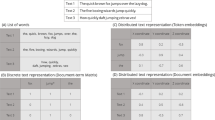Abstract
Noise in textual data such as those introduced by multilinguality, misspellings, abbreviations, deletions, phonetic spellings, non-standard transliteration, etc. pose considerable problems for text-mining. Such corruptions are very common in instant messenger and short message service data and they adversely affect off-the-shelf text mining methods. Most techniques address this problem by supervised methods by making use of hand labeled corrections. But they require human generated labels and corrections that are very expensive and time consuming to obtain because of multilinguality and complexity of the corruptions. While we do not champion unsupervised methods over supervised when quality of results is the singular concern, we demonstrate that unsupervised methods can provide cost effective results without the need for expensive human intervention that is necessary to generate a parallel labeled corpora. A generative model based unsupervised technique is presented that maps non-standard words to their corresponding conventional frequent form. A hidden Markov model (HMM) over a “subsequencized” representation of words is used, where a word is represented as a bag of weighted subsequences. The approximate maximum likelihood inference algorithm used is such that the training phase involves clustering over vectors and not the customary and expensive dynamic programming (Baum–Welch algorithm) over sequences that is necessary for HMMs. A principled transformation of maximum likelihood based “central clustering” cost function of Baum–Welch into a “pairwise similarity” based clustering is proposed. This transformation makes it possible to apply “subsequence kernel” based methods that model delete and insert corruptions well. The novelty of this approach lies in that the expensive (Baum–Welch) iterations required for HMM, can be avoided through an approximation of the loglikelihood function and by establishing a connection between the loglikelihood and a pairwise distance. Anecdotal evidence of efficacy is provided on public and proprietary data.
Similar content being viewed by others
References
Ahmad, F., Kondrak, G.: Learning a spelling error model from search query logs. In: HLT ’05: Proceedings of the Conference on Human Language Technology and Empirical Methods in Natural Language Processing, Morristown, NJ, USA. Association for Computational Linguistics. pp. 955–962 (2005)
Baum L.E., Petrie T., Soules G., Weiss N.: A maximization technique occurring in the statistical analysis of probabilisitic functions of Markov chains. Ann. Math. Stat. 41(1), 164–171 (1970)
Brill, E., Moore, R.C.: An improved model for noisy spelling correction. In: Proceedings of 38th Annual Meeting of the ACL, pp. 286–293 (2000)
Brown P.F., Della Pietra V.J., deSouza P.V., Lai J.C., Mercer R.L.: Class-based n-gram models of natural language. Comput. Linguist. 18(4), 467–479 (1992)
Choudhury M., Sharaf R., Jain V., Mukherjee A., Sarkar S., Basu A.: Investigation and modeling of the structure of texting language. Int. J. Doc. Anal. Recognit. 10(3–4), 157–174 (1991)
Cover T.M., Thomas J.A.: Elements of Information Theory. Wiley, New York (1991)
Dempster A.P., Laird N.M., Rubin D.B.: Maximum likelihood from incomplete data via the em algorithm. J. R. Stat. Soc. 39(Series B), 1–38 (1977)
Hofmann, T., Puzicha, J.: Unsupervised learning from dyadic data. Technical Report TR-98-042, International Computer Science Insitute, Berkeley (1998)
How, Y., Kan, M.-Y.: Optimizing predictive text entry for short message service on mobile phones. In: Proceedings of Human Computer Interfaces International (2005)
Karypis, G.: CLUTO—a clustering toolkit. Technical Report #02-017. Department of Computer Science, University of Minnesota (2003)
Kothari, G., Negi, S., Faruquie, T.A., Chakaravarthy, V.T., Subramaniam, L.V.: SMS based interface for FAQ retrieval. In: Joint Conference of the Association for Computational Linguistics and International Joint Conference on Natural Language Processing (ACL-IJCNLP 2009), Singapore (2009)
Kukich K.: Technique for automatically correcting words in text. ACM Comput. Surv. 24, 377–439 (1992)
Lodhi H., Saunders C., Shawe-Taylor J., Cristianini N., Watkins C.: Text classification using string kernels. J. Mach. Learn. Res. 2, 419–444 (2002)
Navarro G.: A guided tour to approximate string matching. ACM Comput. Surv. 33(1), 31–88 (2001)
Rabiner L.R.: A tutorial on hidden Markov models and selected applications in speech recognition. Proc. IEEE 77(2), 257–286 (1989)
Shi J., Malik J.: Normalized cuts and image segmentation. IEEE Trans. Pattern Anal. Mach. Intell. 22(8), 888–905 (2000)
Smyth P., Heckerman D., Jordan M.I.: Probabilistic independence networks for hidden Markov probability models. Neural Comput. 9(2), 227–269 (1992)
Sproat R., Black A., Chen S., Kumar S., Ostendorf M., Richards C.: Normalization of non-standard words. Comput. Speech Lang. 15, 287–333 (1992)
Toutanova, K., Moore, R.C.: Pronunciation modelling for improved spelling correction. In: Proceedings of 40th Annual Meeting of the ACL, pp. 144–151 (2002)
Author information
Authors and Affiliations
Corresponding author
Additional information
The work was done when S. Acharyya visited IBM Research, India.
Rights and permissions
About this article
Cite this article
Acharyya, S., Negi, S., Subramaniam, L.V. et al. Language independent unsupervised learning of short message service dialect. IJDAR 12, 175–184 (2009). https://doi.org/10.1007/s10032-009-0093-9
Received:
Revised:
Accepted:
Published:
Issue Date:
DOI: https://doi.org/10.1007/s10032-009-0093-9




